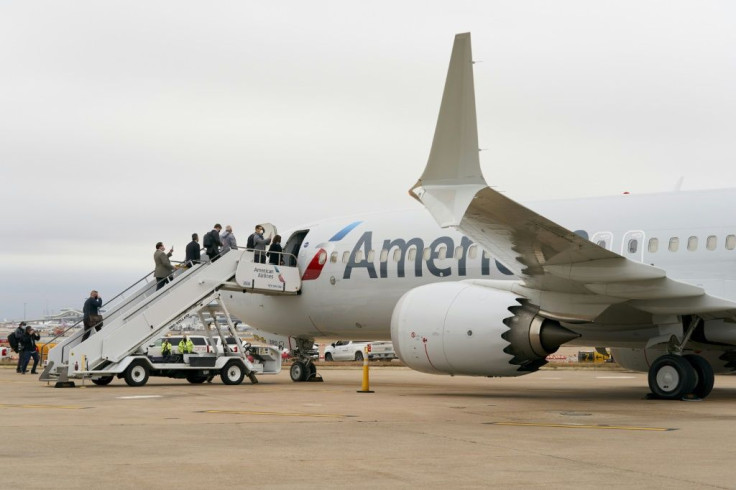The Return Of The Boeing 737 MAX: Too Much Too Soon?
KEY POINTS
- American Airlines reintroduced the 737 MAX on Tuesday
- The flight comes amid a lull in travel
- Consumers may be reluctant to fly because of the pandemic
American Airlines flight 718 left Miami late Tuesday morning, marking the airliner’s reintroduction of the Boeing 737. The return comes amid a pronounced lull in air travel, however, raising questions about the need to maintain a fleet of mega-jets.
According to the Reuters news service, American Airlines counts 31 of the 737 MAX jet in its fleet. The jumbo jet was grounded in March 2019 after two crashes over five months left 346 people dead, but returned to U.S. service Tuesday with the flight from Miami to New York.
The U.S. Federal Aviation Administration cleared the aircraft for flight again in November after Boeing made several improvements on software and training protocols.
“This aircraft is ready to go,” American Airlines’ President Robert Isom was quoted by Reuters as saying Tuesday.
U.S. air travel has increased during the holiday season. The Transportation Security Administration reported 1.1 million people moved through its checkpoints on Monday, though that level is indicative of people traveling due to the holiday season. With the ongoing pandemic though, the amount of through traffic in airports in November was as low as 575,000.
Air travel could be further supported by vaccine distribution given American’s presence in the U.S. supply chain. The airliner transported its first batch of vaccines for COVID-19 on Dec. 14, though that does little to support passenger levels.
Boeing, for its part, could be facing a multi-billion-dollar problem with the 737. The company in December reported new orders from Alaskan Airlines and Ireland’s low-cost airline Ryanair, though Boeing doesn’t get paid until those are delivered.
In November, analysis from CNN found Boeing was out some $20.7 billion from the grounding of the jumbo jet. Demand, despite the holiday bump, remains suppressed as well. Over the four-week period ending Dec. 18, the U.S. Energy Department reported jet fuel demand was down by about 33% year-on-year.
For American Airlines, that lull in demand showed up as a 73% year-on-year drop in revenue during the third quarter. A pre-holiday survey from the Pew Research Center, meanwhile, found more than half of the respondents said the pandemic would alter how, or if, they traveled at all.
The rise of video conference calls during the pandemic, meanwhile, may diminish the need for corporate travel in a post-pandemic world. On attitudes in general, Lucy Rattrie, a business psychologist, told British travel management company Gray Dawes Travel that mindsets have changed. On one hand, people will certainly look to break cabin fever with increased vacationing.
“Yet, at the same time, people will likely be apprehensive and concerned, traveling with a lot more self-care, looking after themselves physically, emotionally, spiritually and mentally,” she said.
Commenting on the legacy of the Boeing 737 itself, aviation historian Graham Simons said the latest iteration was likely a mistake
“They should have never come out with it in the first place,” he told CNN.

© Copyright IBTimes 2024. All rights reserved.





















